Mental Health and Social Work in Australia: A Comprehensive Overview
VerifiedAdded on 2023/03/31
|9
|1696
|307
Report
AI Summary
This report delves into the multifaceted realm of mental health and social work in Australia. It commences by presenting crucial statistical data on the prevalence of mental illnesses within the Australian population, offering insights into the magnitude of the issue. The report then transitions to an examination of the legislative framework, policies, and practical guidelines that govern social work practices in the mental health domain, including the role of the Department of Health. A significant portion of the report is dedicated to the practice standards for mental health social workers, highlighting key components such as values, ethics, professionalism, and culturally responsive practices. It emphasizes the importance of upholding human rights and the core responsibilities of social workers, including consultation, patient empowerment, and addressing challenges like resource limitations and the need for specialized training. Furthermore, the report explores the unique mental health considerations for specific groups, including Aboriginal and Torres Strait Islander communities and women in prison. It concludes by examining cultural competence in social work practice and the importance of understanding cultural differences in mental health assessment and care, referencing relevant literature and case examples within Australia's multicultural society. The report is well-referenced and provides a comprehensive overview of the field.

1
Running Head: MENTAL HEALTH AND SOCIAL HEALTH
MENTAL HEALTH AND SOCIAL HEALTH
Name of Student
Institution
Tutor
Date
Running Head: MENTAL HEALTH AND SOCIAL HEALTH
MENTAL HEALTH AND SOCIAL HEALTH
Name of Student
Institution
Tutor
Date
Paraphrase This Document
Need a fresh take? Get an instant paraphrase of this document with our AI Paraphraser
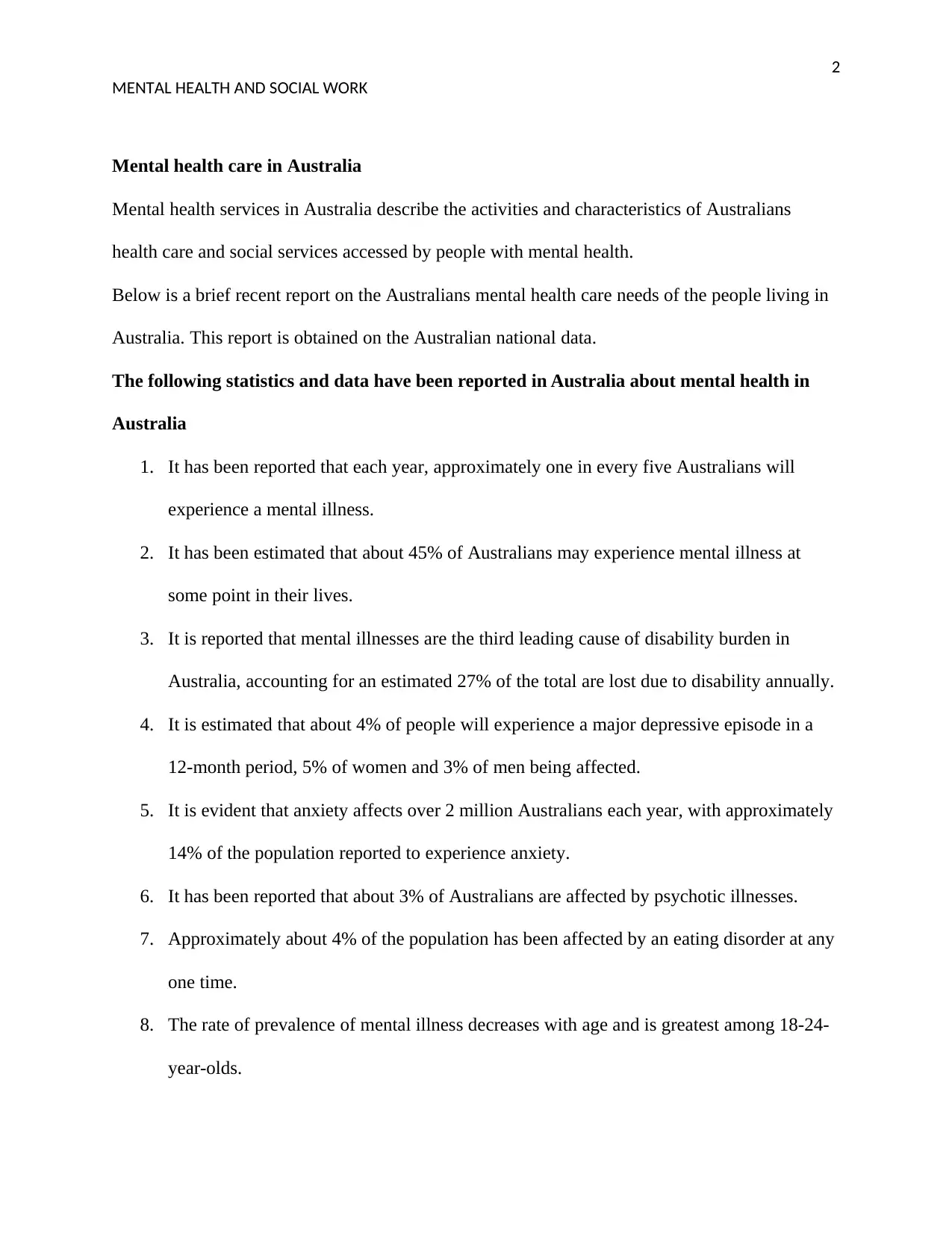
2
MENTAL HEALTH AND SOCIAL WORK
Mental health care in Australia
Mental health services in Australia describe the activities and characteristics of Australians
health care and social services accessed by people with mental health.
Below is a brief recent report on the Australians mental health care needs of the people living in
Australia. This report is obtained on the Australian national data.
The following statistics and data have been reported in Australia about mental health in
Australia
1. It has been reported that each year, approximately one in every five Australians will
experience a mental illness.
2. It has been estimated that about 45% of Australians may experience mental illness at
some point in their lives.
3. It is reported that mental illnesses are the third leading cause of disability burden in
Australia, accounting for an estimated 27% of the total are lost due to disability annually.
4. It is estimated that about 4% of people will experience a major depressive episode in a
12-month period, 5% of women and 3% of men being affected.
5. It is evident that anxiety affects over 2 million Australians each year, with approximately
14% of the population reported to experience anxiety.
6. It has been reported that about 3% of Australians are affected by psychotic illnesses.
7. Approximately about 4% of the population has been affected by an eating disorder at any
one time.
8. The rate of prevalence of mental illness decreases with age and is greatest among 18-24-
year-olds.
MENTAL HEALTH AND SOCIAL WORK
Mental health care in Australia
Mental health services in Australia describe the activities and characteristics of Australians
health care and social services accessed by people with mental health.
Below is a brief recent report on the Australians mental health care needs of the people living in
Australia. This report is obtained on the Australian national data.
The following statistics and data have been reported in Australia about mental health in
Australia
1. It has been reported that each year, approximately one in every five Australians will
experience a mental illness.
2. It has been estimated that about 45% of Australians may experience mental illness at
some point in their lives.
3. It is reported that mental illnesses are the third leading cause of disability burden in
Australia, accounting for an estimated 27% of the total are lost due to disability annually.
4. It is estimated that about 4% of people will experience a major depressive episode in a
12-month period, 5% of women and 3% of men being affected.
5. It is evident that anxiety affects over 2 million Australians each year, with approximately
14% of the population reported to experience anxiety.
6. It has been reported that about 3% of Australians are affected by psychotic illnesses.
7. Approximately about 4% of the population has been affected by an eating disorder at any
one time.
8. The rate of prevalence of mental illness decreases with age and is greatest among 18-24-
year-olds.
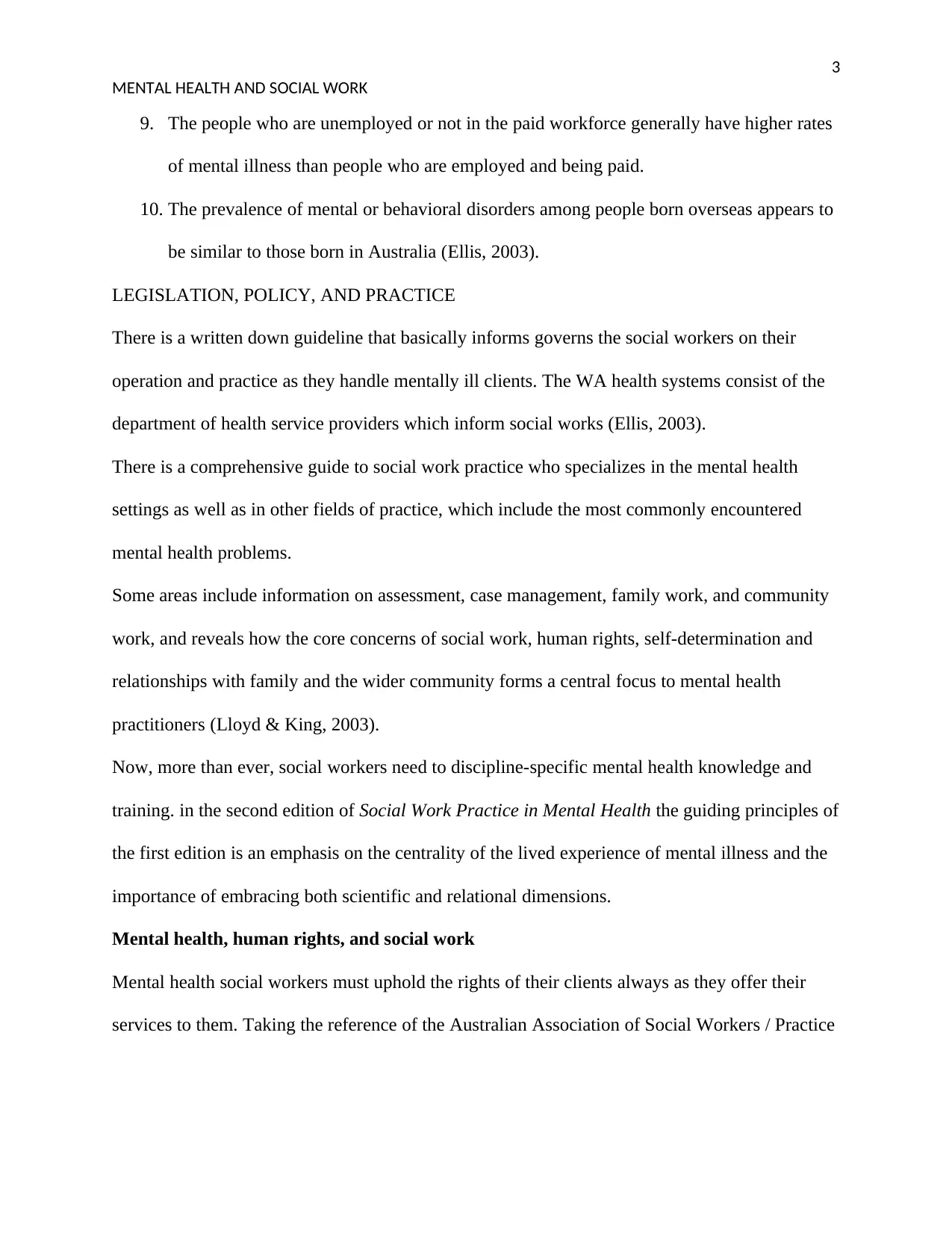
3
MENTAL HEALTH AND SOCIAL WORK
9. The people who are unemployed or not in the paid workforce generally have higher rates
of mental illness than people who are employed and being paid.
10. The prevalence of mental or behavioral disorders among people born overseas appears to
be similar to those born in Australia (Ellis, 2003).
LEGISLATION, POLICY, AND PRACTICE
There is a written down guideline that basically informs governs the social workers on their
operation and practice as they handle mentally ill clients. The WA health systems consist of the
department of health service providers which inform social works (Ellis, 2003).
There is a comprehensive guide to social work practice who specializes in the mental health
settings as well as in other fields of practice, which include the most commonly encountered
mental health problems.
Some areas include information on assessment, case management, family work, and community
work, and reveals how the core concerns of social work, human rights, self-determination and
relationships with family and the wider community forms a central focus to mental health
practitioners (Lloyd & King, 2003).
Now, more than ever, social workers need to discipline-specific mental health knowledge and
training. in the second edition of Social Work Practice in Mental Health the guiding principles of
the first edition is an emphasis on the centrality of the lived experience of mental illness and the
importance of embracing both scientific and relational dimensions.
Mental health, human rights, and social work
Mental health social workers must uphold the rights of their clients always as they offer their
services to them. Taking the reference of the Australian Association of Social Workers / Practice
MENTAL HEALTH AND SOCIAL WORK
9. The people who are unemployed or not in the paid workforce generally have higher rates
of mental illness than people who are employed and being paid.
10. The prevalence of mental or behavioral disorders among people born overseas appears to
be similar to those born in Australia (Ellis, 2003).
LEGISLATION, POLICY, AND PRACTICE
There is a written down guideline that basically informs governs the social workers on their
operation and practice as they handle mentally ill clients. The WA health systems consist of the
department of health service providers which inform social works (Ellis, 2003).
There is a comprehensive guide to social work practice who specializes in the mental health
settings as well as in other fields of practice, which include the most commonly encountered
mental health problems.
Some areas include information on assessment, case management, family work, and community
work, and reveals how the core concerns of social work, human rights, self-determination and
relationships with family and the wider community forms a central focus to mental health
practitioners (Lloyd & King, 2003).
Now, more than ever, social workers need to discipline-specific mental health knowledge and
training. in the second edition of Social Work Practice in Mental Health the guiding principles of
the first edition is an emphasis on the centrality of the lived experience of mental illness and the
importance of embracing both scientific and relational dimensions.
Mental health, human rights, and social work
Mental health social workers must uphold the rights of their clients always as they offer their
services to them. Taking the reference of the Australian Association of Social Workers / Practice
⊘ This is a preview!⊘
Do you want full access?
Subscribe today to unlock all pages.

Trusted by 1+ million students worldwide
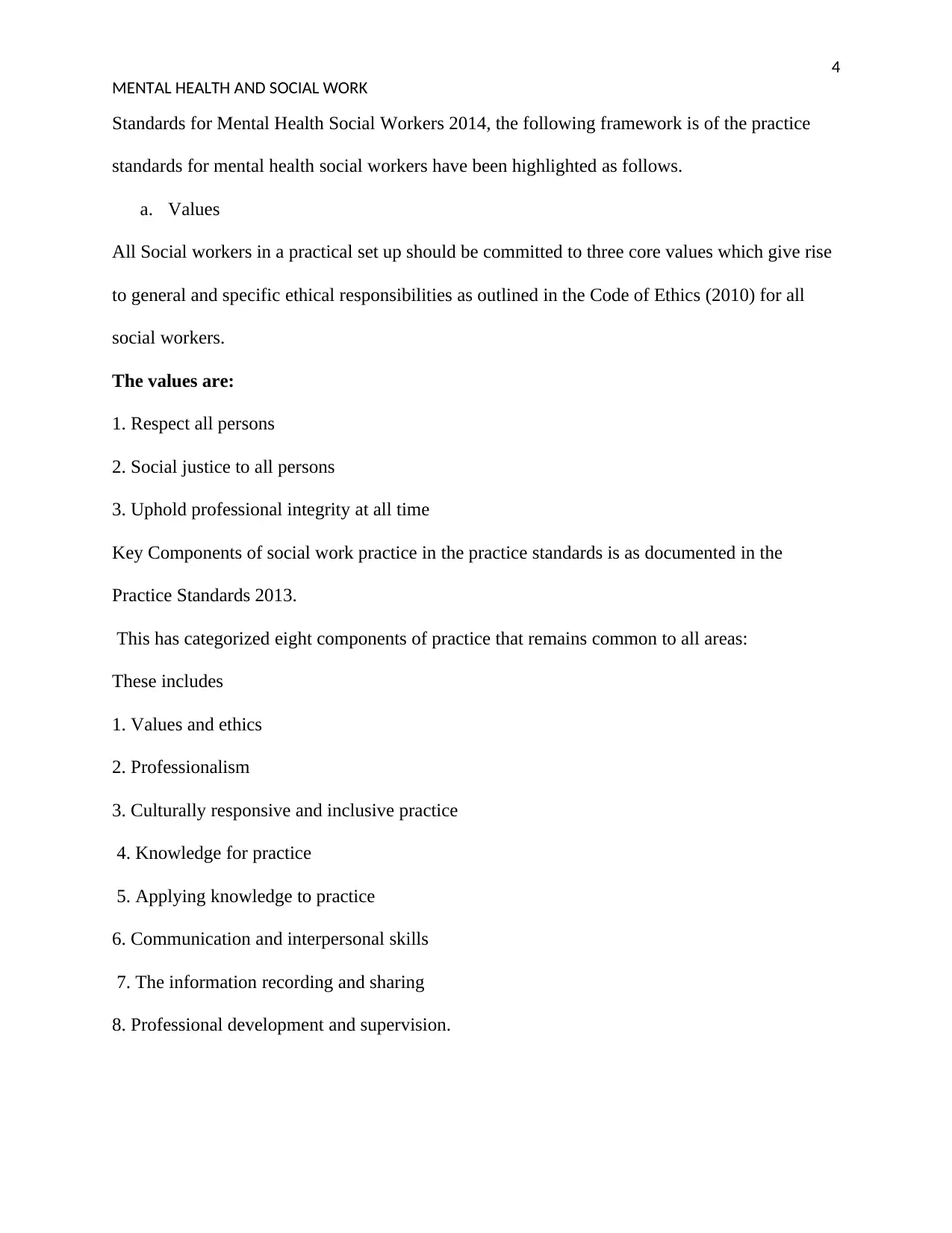
4
MENTAL HEALTH AND SOCIAL WORK
Standards for Mental Health Social Workers 2014, the following framework is of the practice
standards for mental health social workers have been highlighted as follows.
a. Values
All Social workers in a practical set up should be committed to three core values which give rise
to general and specific ethical responsibilities as outlined in the Code of Ethics (2010) for all
social workers.
The values are:
1. Respect all persons
2. Social justice to all persons
3. Uphold professional integrity at all time
Key Components of social work practice in the practice standards is as documented in the
Practice Standards 2013.
This has categorized eight components of practice that remains common to all areas:
These includes
1. Values and ethics
2. Professionalism
3. Culturally responsive and inclusive practice
4. Knowledge for practice
5. Applying knowledge to practice
6. Communication and interpersonal skills
7. The information recording and sharing
8. Professional development and supervision.
MENTAL HEALTH AND SOCIAL WORK
Standards for Mental Health Social Workers 2014, the following framework is of the practice
standards for mental health social workers have been highlighted as follows.
a. Values
All Social workers in a practical set up should be committed to three core values which give rise
to general and specific ethical responsibilities as outlined in the Code of Ethics (2010) for all
social workers.
The values are:
1. Respect all persons
2. Social justice to all persons
3. Uphold professional integrity at all time
Key Components of social work practice in the practice standards is as documented in the
Practice Standards 2013.
This has categorized eight components of practice that remains common to all areas:
These includes
1. Values and ethics
2. Professionalism
3. Culturally responsive and inclusive practice
4. Knowledge for practice
5. Applying knowledge to practice
6. Communication and interpersonal skills
7. The information recording and sharing
8. Professional development and supervision.
Paraphrase This Document
Need a fresh take? Get an instant paraphrase of this document with our AI Paraphraser
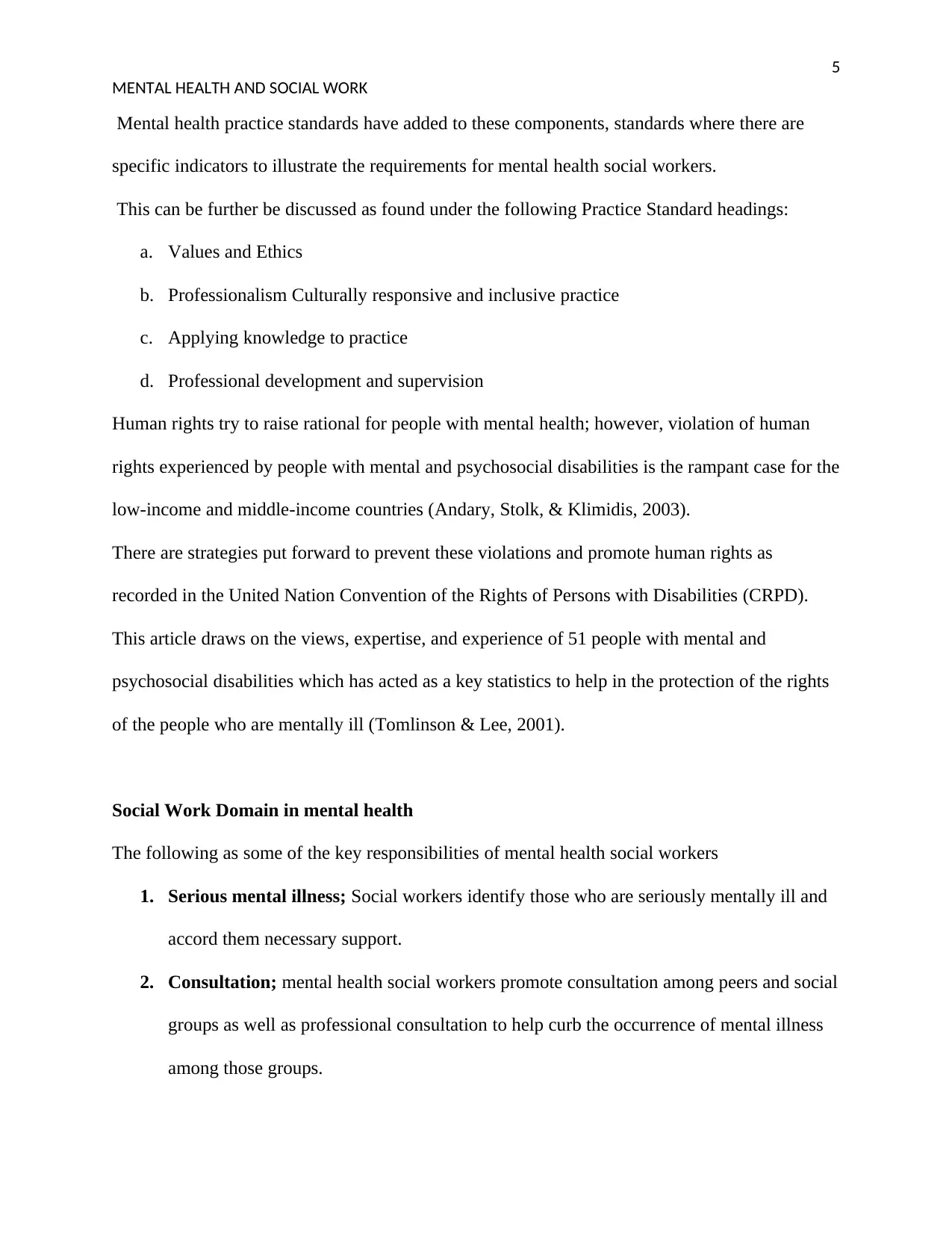
5
MENTAL HEALTH AND SOCIAL WORK
Mental health practice standards have added to these components, standards where there are
specific indicators to illustrate the requirements for mental health social workers.
This can be further be discussed as found under the following Practice Standard headings:
a. Values and Ethics
b. Professionalism Culturally responsive and inclusive practice
c. Applying knowledge to practice
d. Professional development and supervision
Human rights try to raise rational for people with mental health; however, violation of human
rights experienced by people with mental and psychosocial disabilities is the rampant case for the
low-income and middle-income countries (Andary, Stolk, & Klimidis, 2003).
There are strategies put forward to prevent these violations and promote human rights as
recorded in the United Nation Convention of the Rights of Persons with Disabilities (CRPD).
This article draws on the views, expertise, and experience of 51 people with mental and
psychosocial disabilities which has acted as a key statistics to help in the protection of the rights
of the people who are mentally ill (Tomlinson & Lee, 2001).
Social Work Domain in mental health
The following as some of the key responsibilities of mental health social workers
1. Serious mental illness; Social workers identify those who are seriously mentally ill and
accord them necessary support.
2. Consultation; mental health social workers promote consultation among peers and social
groups as well as professional consultation to help curb the occurrence of mental illness
among those groups.
MENTAL HEALTH AND SOCIAL WORK
Mental health practice standards have added to these components, standards where there are
specific indicators to illustrate the requirements for mental health social workers.
This can be further be discussed as found under the following Practice Standard headings:
a. Values and Ethics
b. Professionalism Culturally responsive and inclusive practice
c. Applying knowledge to practice
d. Professional development and supervision
Human rights try to raise rational for people with mental health; however, violation of human
rights experienced by people with mental and psychosocial disabilities is the rampant case for the
low-income and middle-income countries (Andary, Stolk, & Klimidis, 2003).
There are strategies put forward to prevent these violations and promote human rights as
recorded in the United Nation Convention of the Rights of Persons with Disabilities (CRPD).
This article draws on the views, expertise, and experience of 51 people with mental and
psychosocial disabilities which has acted as a key statistics to help in the protection of the rights
of the people who are mentally ill (Tomlinson & Lee, 2001).
Social Work Domain in mental health
The following as some of the key responsibilities of mental health social workers
1. Serious mental illness; Social workers identify those who are seriously mentally ill and
accord them necessary support.
2. Consultation; mental health social workers promote consultation among peers and social
groups as well as professional consultation to help curb the occurrence of mental illness
among those groups.
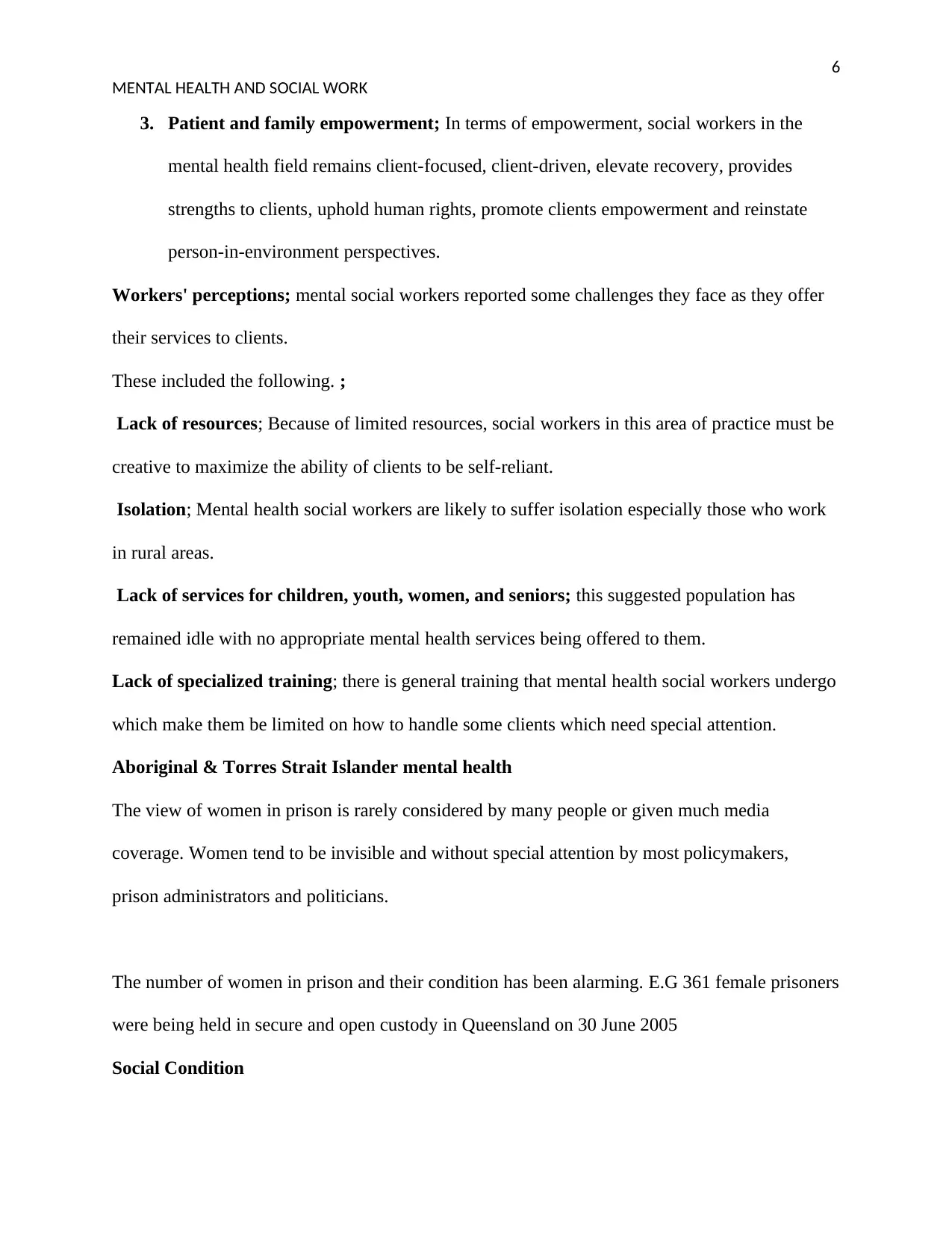
6
MENTAL HEALTH AND SOCIAL WORK
3. Patient and family empowerment; In terms of empowerment, social workers in the
mental health field remains client-focused, client-driven, elevate recovery, provides
strengths to clients, uphold human rights, promote clients empowerment and reinstate
person-in-environment perspectives.
Workers' perceptions; mental social workers reported some challenges they face as they offer
their services to clients.
These included the following. ;
Lack of resources; Because of limited resources, social workers in this area of practice must be
creative to maximize the ability of clients to be self-reliant.
Isolation; Mental health social workers are likely to suffer isolation especially those who work
in rural areas.
Lack of services for children, youth, women, and seniors; this suggested population has
remained idle with no appropriate mental health services being offered to them.
Lack of specialized training; there is general training that mental health social workers undergo
which make them be limited on how to handle some clients which need special attention.
Aboriginal & Torres Strait Islander mental health
The view of women in prison is rarely considered by many people or given much media
coverage. Women tend to be invisible and without special attention by most policymakers,
prison administrators and politicians.
The number of women in prison and their condition has been alarming. E.G 361 female prisoners
were being held in secure and open custody in Queensland on 30 June 2005
Social Condition
MENTAL HEALTH AND SOCIAL WORK
3. Patient and family empowerment; In terms of empowerment, social workers in the
mental health field remains client-focused, client-driven, elevate recovery, provides
strengths to clients, uphold human rights, promote clients empowerment and reinstate
person-in-environment perspectives.
Workers' perceptions; mental social workers reported some challenges they face as they offer
their services to clients.
These included the following. ;
Lack of resources; Because of limited resources, social workers in this area of practice must be
creative to maximize the ability of clients to be self-reliant.
Isolation; Mental health social workers are likely to suffer isolation especially those who work
in rural areas.
Lack of services for children, youth, women, and seniors; this suggested population has
remained idle with no appropriate mental health services being offered to them.
Lack of specialized training; there is general training that mental health social workers undergo
which make them be limited on how to handle some clients which need special attention.
Aboriginal & Torres Strait Islander mental health
The view of women in prison is rarely considered by many people or given much media
coverage. Women tend to be invisible and without special attention by most policymakers,
prison administrators and politicians.
The number of women in prison and their condition has been alarming. E.G 361 female prisoners
were being held in secure and open custody in Queensland on 30 June 2005
Social Condition
⊘ This is a preview!⊘
Do you want full access?
Subscribe today to unlock all pages.

Trusted by 1+ million students worldwide
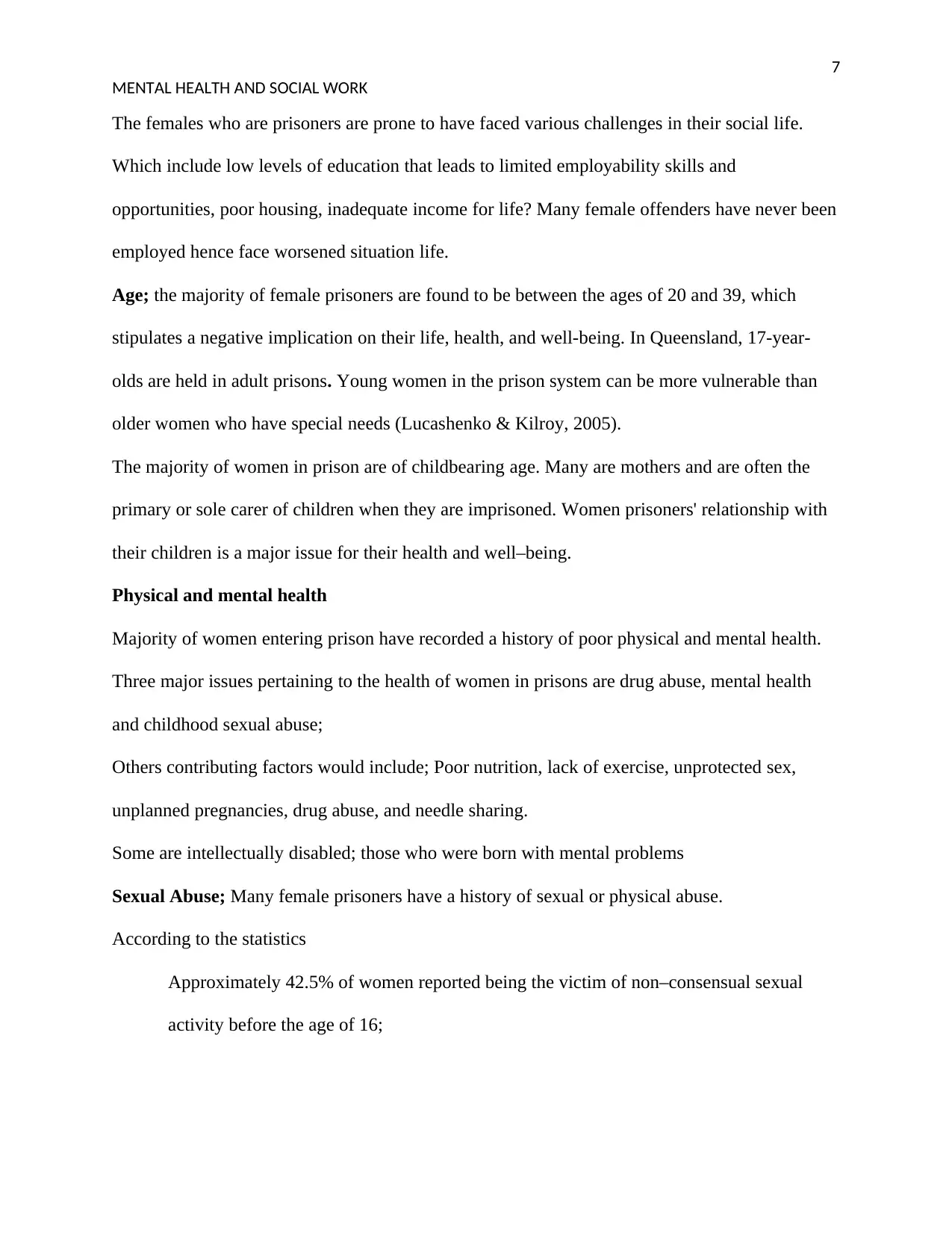
7
MENTAL HEALTH AND SOCIAL WORK
The females who are prisoners are prone to have faced various challenges in their social life.
Which include low levels of education that leads to limited employability skills and
opportunities, poor housing, inadequate income for life? Many female offenders have never been
employed hence face worsened situation life.
Age; the majority of female prisoners are found to be between the ages of 20 and 39, which
stipulates a negative implication on their life, health, and well-being. In Queensland, 17-year-
olds are held in adult prisons. Young women in the prison system can be more vulnerable than
older women who have special needs (Lucashenko & Kilroy, 2005).
The majority of women in prison are of childbearing age. Many are mothers and are often the
primary or sole carer of children when they are imprisoned. Women prisoners' relationship with
their children is a major issue for their health and well–being.
Physical and mental health
Majority of women entering prison have recorded a history of poor physical and mental health.
Three major issues pertaining to the health of women in prisons are drug abuse, mental health
and childhood sexual abuse;
Others contributing factors would include; Poor nutrition, lack of exercise, unprotected sex,
unplanned pregnancies, drug abuse, and needle sharing.
Some are intellectually disabled; those who were born with mental problems
Sexual Abuse; Many female prisoners have a history of sexual or physical abuse.
According to the statistics
Approximately 42.5% of women reported being the victim of non–consensual sexual
activity before the age of 16;
MENTAL HEALTH AND SOCIAL WORK
The females who are prisoners are prone to have faced various challenges in their social life.
Which include low levels of education that leads to limited employability skills and
opportunities, poor housing, inadequate income for life? Many female offenders have never been
employed hence face worsened situation life.
Age; the majority of female prisoners are found to be between the ages of 20 and 39, which
stipulates a negative implication on their life, health, and well-being. In Queensland, 17-year-
olds are held in adult prisons. Young women in the prison system can be more vulnerable than
older women who have special needs (Lucashenko & Kilroy, 2005).
The majority of women in prison are of childbearing age. Many are mothers and are often the
primary or sole carer of children when they are imprisoned. Women prisoners' relationship with
their children is a major issue for their health and well–being.
Physical and mental health
Majority of women entering prison have recorded a history of poor physical and mental health.
Three major issues pertaining to the health of women in prisons are drug abuse, mental health
and childhood sexual abuse;
Others contributing factors would include; Poor nutrition, lack of exercise, unprotected sex,
unplanned pregnancies, drug abuse, and needle sharing.
Some are intellectually disabled; those who were born with mental problems
Sexual Abuse; Many female prisoners have a history of sexual or physical abuse.
According to the statistics
Approximately 42.5% of women reported being the victim of non–consensual sexual
activity before the age of 16;
Paraphrase This Document
Need a fresh take? Get an instant paraphrase of this document with our AI Paraphraser
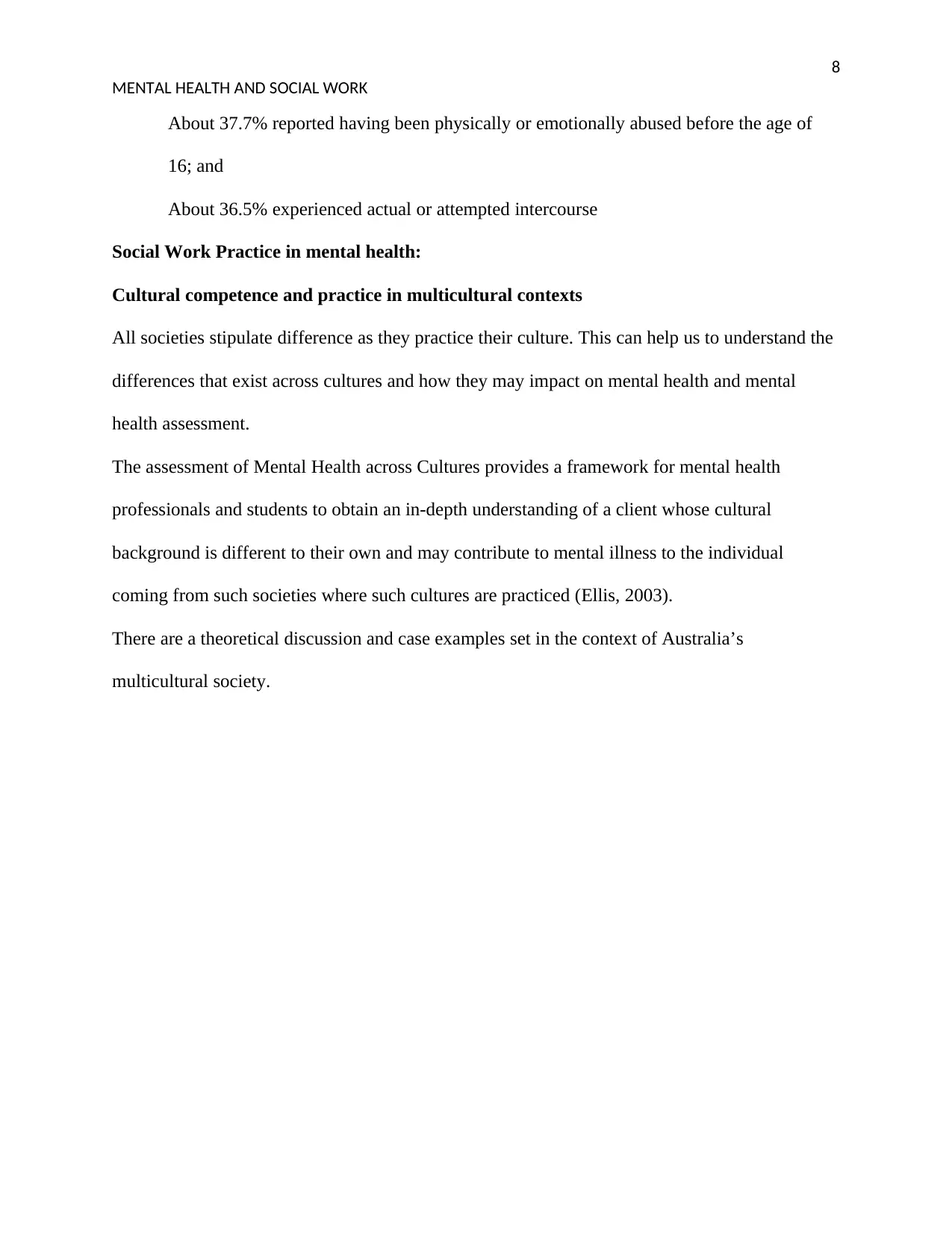
8
MENTAL HEALTH AND SOCIAL WORK
About 37.7% reported having been physically or emotionally abused before the age of
16; and
About 36.5% experienced actual or attempted intercourse
Social Work Practice in mental health:
Cultural competence and practice in multicultural contexts
All societies stipulate difference as they practice their culture. This can help us to understand the
differences that exist across cultures and how they may impact on mental health and mental
health assessment.
The assessment of Mental Health across Cultures provides a framework for mental health
professionals and students to obtain an in-depth understanding of a client whose cultural
background is different to their own and may contribute to mental illness to the individual
coming from such societies where such cultures are practiced (Ellis, 2003).
There are a theoretical discussion and case examples set in the context of Australia’s
multicultural society.
MENTAL HEALTH AND SOCIAL WORK
About 37.7% reported having been physically or emotionally abused before the age of
16; and
About 36.5% experienced actual or attempted intercourse
Social Work Practice in mental health:
Cultural competence and practice in multicultural contexts
All societies stipulate difference as they practice their culture. This can help us to understand the
differences that exist across cultures and how they may impact on mental health and mental
health assessment.
The assessment of Mental Health across Cultures provides a framework for mental health
professionals and students to obtain an in-depth understanding of a client whose cultural
background is different to their own and may contribute to mental illness to the individual
coming from such societies where such cultures are practiced (Ellis, 2003).
There are a theoretical discussion and case examples set in the context of Australia’s
multicultural society.
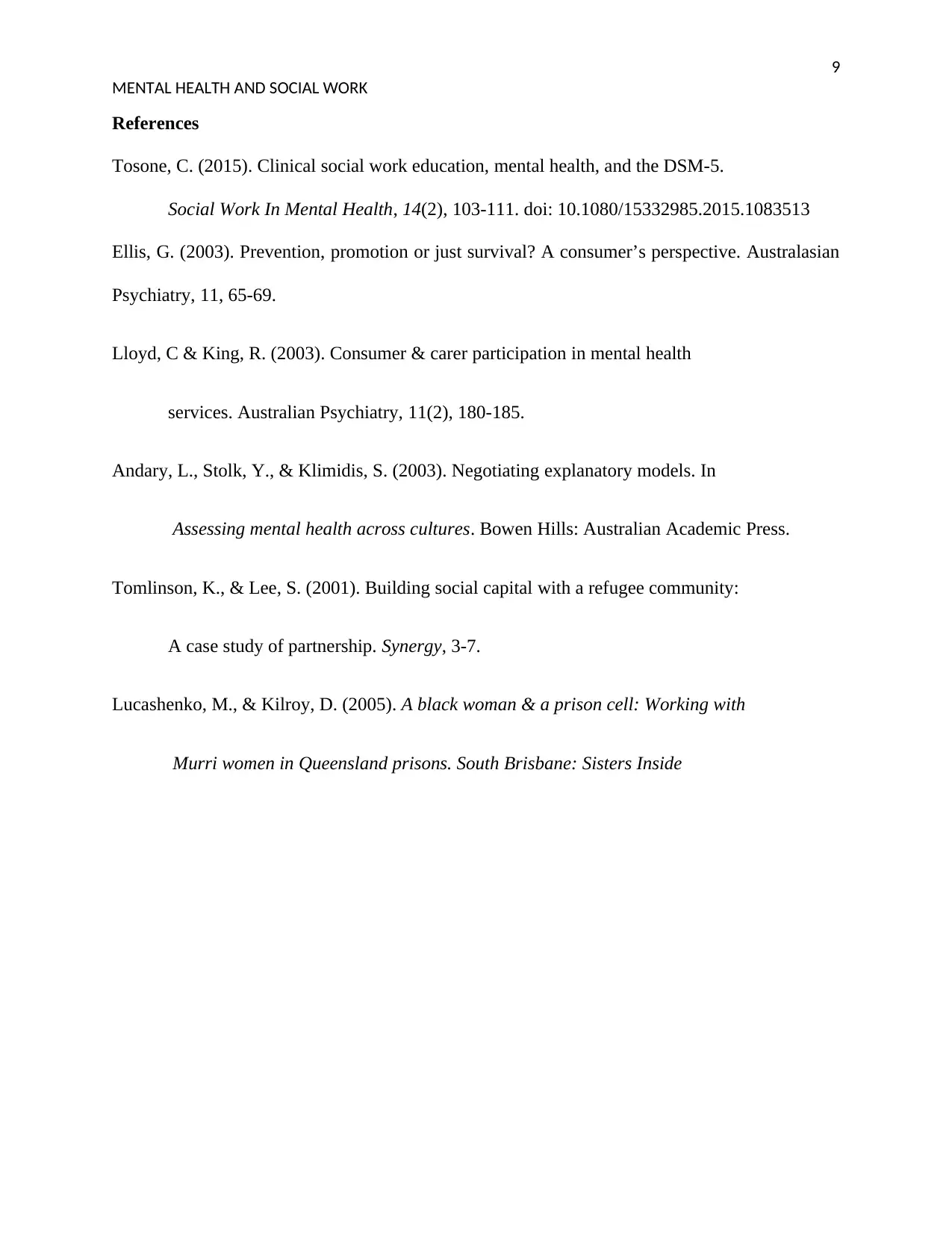
9
MENTAL HEALTH AND SOCIAL WORK
References
Tosone, C. (2015). Clinical social work education, mental health, and the DSM-5.
Social Work In Mental Health, 14(2), 103-111. doi: 10.1080/15332985.2015.1083513
Ellis, G. (2003). Prevention, promotion or just survival? A consumer’s perspective. Australasian
Psychiatry, 11, 65-69.
Lloyd, C & King, R. (2003). Consumer & carer participation in mental health
services. Australian Psychiatry, 11(2), 180-185.
Andary, L., Stolk, Y., & Klimidis, S. (2003). Negotiating explanatory models. In
Assessing mental health across cultures. Bowen Hills: Australian Academic Press.
Tomlinson, K., & Lee, S. (2001). Building social capital with a refugee community:
A case study of partnership. Synergy, 3-7.
Lucashenko, M., & Kilroy, D. (2005). A black woman & a prison cell: Working with
Murri women in Queensland prisons. South Brisbane: Sisters Inside
MENTAL HEALTH AND SOCIAL WORK
References
Tosone, C. (2015). Clinical social work education, mental health, and the DSM-5.
Social Work In Mental Health, 14(2), 103-111. doi: 10.1080/15332985.2015.1083513
Ellis, G. (2003). Prevention, promotion or just survival? A consumer’s perspective. Australasian
Psychiatry, 11, 65-69.
Lloyd, C & King, R. (2003). Consumer & carer participation in mental health
services. Australian Psychiatry, 11(2), 180-185.
Andary, L., Stolk, Y., & Klimidis, S. (2003). Negotiating explanatory models. In
Assessing mental health across cultures. Bowen Hills: Australian Academic Press.
Tomlinson, K., & Lee, S. (2001). Building social capital with a refugee community:
A case study of partnership. Synergy, 3-7.
Lucashenko, M., & Kilroy, D. (2005). A black woman & a prison cell: Working with
Murri women in Queensland prisons. South Brisbane: Sisters Inside
⊘ This is a preview!⊘
Do you want full access?
Subscribe today to unlock all pages.

Trusted by 1+ million students worldwide
1 out of 9
Related Documents
Your All-in-One AI-Powered Toolkit for Academic Success.
+13062052269
info@desklib.com
Available 24*7 on WhatsApp / Email
![[object Object]](/_next/static/media/star-bottom.7253800d.svg)
Unlock your academic potential
Copyright © 2020–2026 A2Z Services. All Rights Reserved. Developed and managed by ZUCOL.





